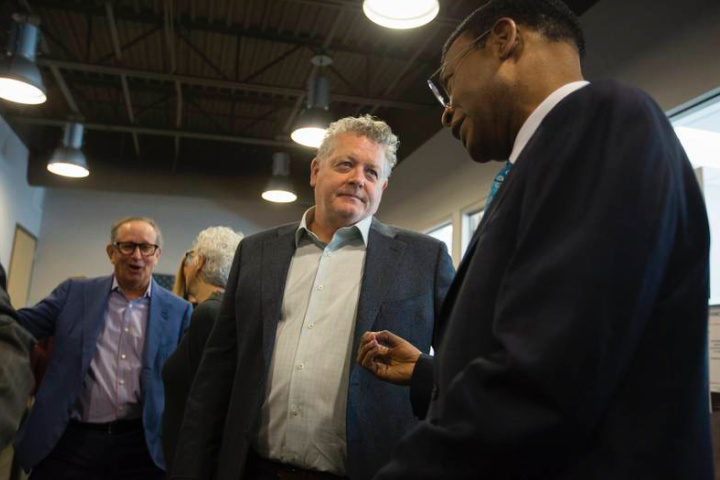From The Virginian-Pilot By Trevor Metcalfe

Center: Jeff Conroy, CEO of Embody, a Norfolk biotech company at the Innovation Research Park at Old Dominion University, talks with Norfolk Mayor Kenny Alexander after an announcement of the company’s expansion Tuesday morning April 5, 2022. (Bill Tiernan/The Virginian-Pilot)
A Norfolk biotech company that creates implants designed to help heal knee and shoulder injuries is expanding its Hampton Roads facilities.
Embody, a manufacturer of collagen-based implants plans to spend $5 million to increase its lab and office space at Old Dominion University’s Innovation Research Park, Gov. Glenn Youngkin announced Monday in Norfolk. The expansion is expected to create at least 92 jobs.
“This is what growth is all about, so I’m so excited to be here,” Youngkin said.
Embody leaders hope to surpass that job growth in the coming years, said Christine Nelson, vice president of manufacturing and logistics. The company has 44 employees, and leaders eventually want to grow to 200.
Company employees tend to stick around because it’s such a fulfilling place to work, Nelson added.
Embody was founded in 2014 and started with just two employees, CEO Jeff Conroy said. The company now produces around $25 million in products annually, and Conroy aims to produce more than 10 times that amount by the end of this year.
To do that, the firm will be adding 10,000 square feet of office, lab, and manufacturing space to its headquarters, including two new clean rooms. The expansion should be complete by September, he said.
“I don’t think there’s a better place to start a company,” Conroy said about Norfolk. “We have found people here. We have found investors here. We have found partners here. We have patients here.”
Conroy said the new positions will be in the areas of manufacturing, quality, engineering, and logistics. Salaries will range from $50,000 to $140,000 annually, he added.
Embody’s products are designed to help heal soft tissue injuries commonly encountered by athletes and soldiers. For example, instead of removing healthy tissue after a tear of the anterior cruciate ligament, or ACL, a doctor could implant a collagen graft that would aid in repairing the tissue.
The defense industry is also interested in the potential for more effective injury healing. Since 2019, the company has been awarded around $2.4 million in federal contracts, according to USAspending.gov. The company has received more than $20 million in Department of Defense and Defense Advanced Research Projects Agency funding in total, according to the announcement.
Trevor Metcalfe, 757-222-5345, trevor.metcalfe@pilotonline.com






